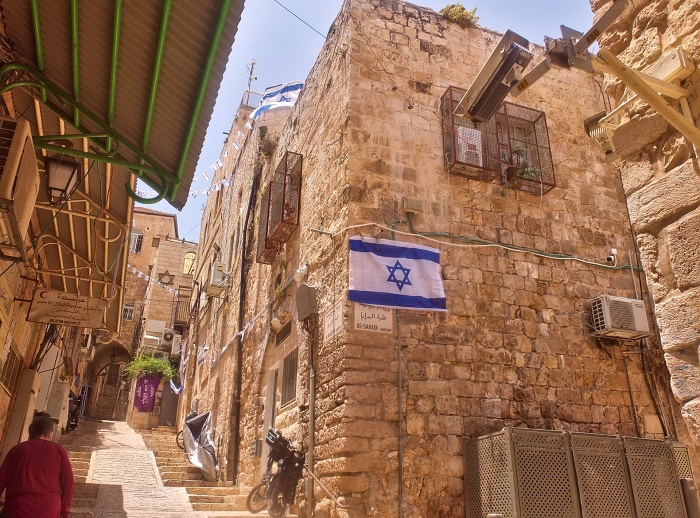
The Palestinians have a word, sumud that encapsulates their practical philosophy with regard to their dealing with adversity, particularly the adversity of the Occupation. It roughly means resilience. It can take the form of various forms of resistance: violent or non-violent. But it comes from a mindset or historical consciousness of clinging to the land and outwaiting every new conqueror – be it the Jews, or the British, or the Ottomans or the Crusadors, or whoever boisterously asserts their claim to be the new power in the land. Sumud is a powerful force in the face of opposition: a “we will prevail, just like we have always done” statement. Invaders will come and go: the Jews will eventually go back to their countries, with their tail between their legs, just like the Crusaders did before them.
The Jews too have a form of sumud, which is integral to Zionism. According to their narrative, they do not come to Israel as did the early colonials (or as does every new hopeful immigrant) to the Americas. They return to Israel. They come back home. In their conception, they are not colonizers. Wherever else they have attempted to live in the world, they have been reviled, despised, oppressed, enslaved, kicked-out or gassed. Now they are coming home to their own country. Of course, there are other people living here, just as when they previously returned from Egypt in the Biblical period. It is they who are the true encroachers, who don’t belong here. The Arabs have 40 countries where they can live just as well. Let them go there instead.
This is the long-term goal that has guided the Zionist enterprise since Jews began to arrive in the 19th century. You obtain a little land, then another bit, and gradually you build a country. It just requires long-term, patient determination. That’s the policy now in the West Bank. You use a combination of tricks; confiscate land for military purposes, then re-zone it for settlement. Claim prior ownership by Jews. Take advantage of inadequate legal claims, such as that no-one registered the land, but just happened to live there; claim that an existing settlement requires additional land for “natural expansion”; take advantage of loopholes in Mandatory or Ottoman law, or the loose provisions of the Oslo agreements. If you are a settler, make it hard for Palestinian farmers to harvest their olives – or simply steal the crops, or uproot, burn or poison them. Make it hard for their children to go to school, use every creative tactic you can think of. Eventually “we will prevail” – we will get them out from what was ours to begin with.
So which sumud, and whose resilience will prevail here? What happens when an irresistable force meets an unmovable object?
Historically, what happened to a large degree was that the people living on and working the land maintained their position by gradual assimilation. They could change their customs, religions and languages to match those of the conqueror. The Palestinians of today, are to some extent, the Jews of yesterday. Under the Byzantines they became Christian, under the Arabs and Turks they became Muslim. And who is to say the Jews of yore were not for the most part Jebusites or Canaanites? Even the Biblical narrative shows intermarriage and assimilation. And, at the same time, the Jews who “came back” to establish modern-day Israel look suspiciously like the peoples in the lands from which they came: like Russians, Germans, Moroccans, Iraqis, Indians, Africans or Chinese.
People are first people and then something else; human beings with various accretions of religious, social, linguistic or tribal identity. Why is it so hard to see that we are all essentially the same?
What human beings have in common is that they do best under conditions of peace. Palestinian villagers just want to be left alone to live their lives. Jewish immigrants want a place to settle, educate their children, and make a living.
Peace is never a stable quality or level to be attained and then done with; it’s fragile and always something you need to work at. But the best way to establish peace is to allow the historical pattern of gradual assimilation to assert itself once again. Not to fight, but to integrate. Rather than trying to “liberate” the land from those who were there first, allow them the opportunity to become members or citizens in the new structure. Eventually you won’t need to get rid of them because they will become just like you. And you will also assimilate some of their qualities too; that cannot be avoided. In fact, that’s already happening too. Resistance to cultural assimilation is useless. Geography and climate are determining factors in themselves.
This is an unpopular story that hardly anybody; whether Jew or Palestinian, wants to hear, but given a hundred years, or a thousand, it’s the one that is likely to win, even if never acknowledged. And then, this being the Levant, before we know it, the next conquering hero will arrive to supplant the previous one, and the cycle will begin anew.
